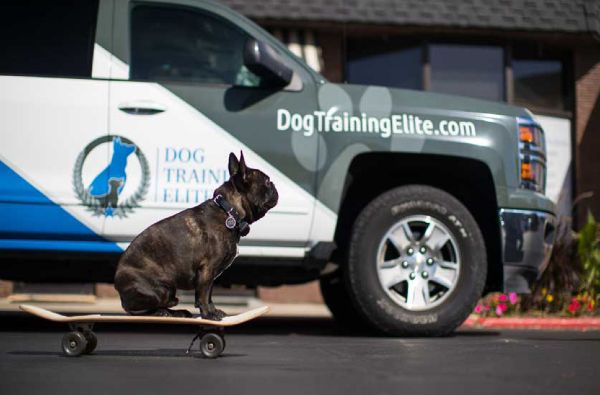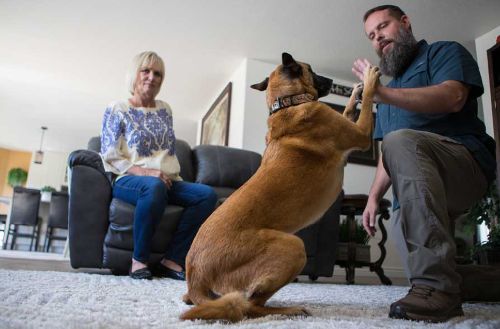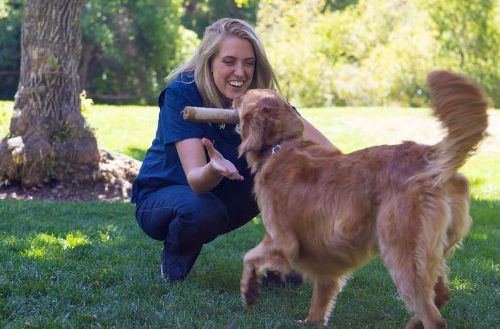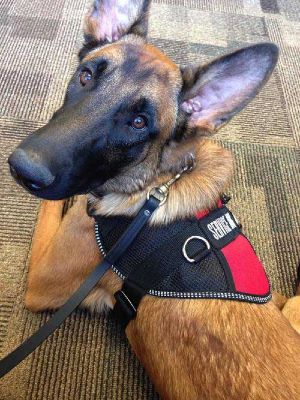Request a Free Assessment

Over the past decade there has been a rise in the number of people with Emotional Support Animals. This has caused some confusion around what it means to have a service, emotional support or therapy animal . Here, we explain briefly the differences between each of these animals, the training required for each different type, and debunk some common myths. Read on to learn the differences between each type of animal, which one might be right for you or your loved one, and how Dog Training Elite Rhode Island can help.

Not all training packages may be available at our Dog Training Elite Rhode Island location, please reference our pricing page for complete information on services offered.





ESA vs. Therapy vs. Service Animals: What's the Difference?
Service Animals
Service animals are animals that have been trained to assist individuals with tasks specific to their needs.
- Redirecting attention when an individual is beginning to feel overstimulated
- Reminding owners to take medication
- Waking someone who is having a nightmare
Service dogs are valued in the mental health, health care and disability community and are protected under ADA laws which allow owners to take their service dog with them everywhere they go. Dog Training Elite Rhode Island trains dogs to serve individuals with autism, diabetes and PTSD.
Dog Training Elite Rhode Island trains autism service dogs to benefit and assist children with autism. Autism service dogs can be trained to track their child in case of wandering and redirect a child’s behavior when they are starting to become overwhelmed.
PTSD service dogs help ground owners to reality, especially in public settings. These service dogs can also be trained to recognize signs of a panic attack and regulate emotional responses through pressure.
Diabetic service dogs can alert their owners to their low blood sugar and provide stability, safety and support.
Visit our individual web pages to understand more about the differences and benefits of autism service dogs, PTSD services dogs and diabetic service dogs.
Emotional Support Animals
Although all dog owners may feel the emotional benefits of owning a dog, the dog needs to be prescribed by a licensed mental health professional to a person with a disabling mental illness such as anxiety or depression to legally be considered an ESA. Emotional Support dogs can be of any age and any breed whereas service dogs usually begin training as puppies.
In addition to being prescribed by a mental health professional, owners may wish for their dog to undergo more specific training. If you are looking for emotional support dog training in your local area, Dog Training Elite Rhode Island has you covered.
The professional dog trainers of Dog Training Elite Rhode Island are experienced with training various types of therapy animals. Trainers work with a dog’s natural temperament to ensure a strong, loving bond between dog and owner. Training can be personalized to fit the needs of the owner.
It is important to note that Emotional Support Animals are meant for just that - emotional support. Dogs trained to assist with specific tasks that may be associated with a disability are service animals. Training a dog to be an Emotional Support Animal or a therapy dog is less intensive than training to be a service animal.
Therapy Animals
Therapy Animals are very similar to Emotional Support Animals, except that they are often used to bolster the mental health and wellbeing of a community, as opposed to just an individual. Therapy dogs are often seen serving in hospitals, rehabilitation or care centers with their owners.
Owners who feel their dog may be a good fit for this kind of community service can have them receive top-notch training from Dog Training Elite Rhode Island.
The most important thing to note as a difference between Emotional Support Animals, Therapy and Service dogs, is service animals are protected under the Americans with Disabilities Act which states service animals must be able to accompany their owners wherever they go. Emotional Support and Therapy animals do not have the same protections and public establishments may have their own rules about ESA and therapy dogs.
Whether you’re ready to get a new lease on life with the help of a service dog, or strengthen the existing bond with your dog, Dog Training Elite Rhode Island has the experience and resources you need.
Our Balanced Theory
We base our training around the "Classical Conditioning" model (a.k.a. "Pavlovian" or "respondent conditioning"). This includes developing conditioned or automatic reflexes to commands. In its simplest form (after proper conditioning), when the owner says "sit," the dog automatically sits without thinking about it. Our unique techniques ensure our program is a success no matter what behavior we encounter.
Empowering Owners
We empower owners to train so their dog knows who to obey at all times.
Personalized
We deal with problem behaviors on a personal basis.
Environment Specific
We train wherever issues tend to arise (i.e. jogging, park, home).
Supportive
We support owners in the off-hours (when training is "not in session").
Involved
We work with all members of the household.
Simplified & Customized
We plan training around the owner's schedule and require only 20 min/day follow-up practice.
Continued Training
Additional programs / group sessions offered after in-home training.
Lifetime Investment
We follow up & are invested in the owner's success long-term.
Satisfaction Ratings
Our high client satisfaction rating sets us apart from competitors.
clas·si·cal con·di·tion·ing PSYCHOLOGY noun A learning process that occurs when two stimuli are repeatedly paired; a response that is at first elicited by the second stimulus and is eventually elicited by the first stimulus alone.
We help your dog become a valued companion and beloved member of the family. Read what our customers have to say and then give us a call!
I’d like to be president of Danielle’s fan club when theres a job opening. She transformed my 1 yr old Black Mouth Cur into a happily obedient roommate. Danielle is accomplished and elegant with dogs, patient and quietly firm until she gets the desired results. It’s been an amazingly happy and positive experience that we will expand and treasure for many years to come. So worth it!— Jack
Posted September 24th 2024
Danielle is the BEST! She is one of those people who just has a natural "connection" with dogs. She is very patient, kind, understanding, and extremely helpful. I can't say enough good things about her, and I'm so glad we are lucky enough to have found her for our training. 😊— Charles Peckham Jr.
Posted September 2nd 2024
Danielle is the BEST! She is one of those people who just has a natural "connection" with dogs. She is very patient, kind, understanding, and extremely helpful. I can't say enough good things about her, and I'm so glad we are lucky enough to have found her for our training.— Charles
Posted September 2nd 2024
Danielle is absolutely fantastic! She has a true understanding of each dog's temperament and abilities. She knows just how far to push them each class so that they can reach their full potential.— Michelle Pacheco
Posted August 31st 2024
Danielle is amazing! She has been working with me and our newly adopted Alaskan Malamute, Storm. She has been patient and kind as Storm and I work together to become a pet therapy team. Storm adores Danielle and enjoys every class we attend.— Donna Zannelli
Posted August 18th 2024
I adopted a two year old Alaskan Malamute. When we got her, she was nervous, suffered from separation anxiety, and constantly used her big paws to get our attention. Danielle has been so patient and kind with both me and our Storm. Working with Danielle, Storm now walks on a lead with confidence, no long uses her paws to get our attention, and can now be left alone at home without her howling or being destructive. Storm actually looks forward to our lessons, and so do I. Danielle has helped us become a team. I highly recommend Danielle and Dog Training Elite to anyone who has a dog, regardless of their age or breed!— Donna Zannelli
Posted August 18th 2024
Danielle is an amazing trainer! I couldn’t recommend her enough. She was patient and kind during all sessions. My dog is an amazing service animal thanks to Danielle and it’s made a huge difference in my life.— T Tat
Posted July 8th 2024
Danielle is the best by far of dog trainers I've known. She knows what she's doing and does it exceptionally well.— Andrew Frisch
Posted June 22nd 2024
Danielle helped us to train our Great Dane puppy in no time. We have a toddler and a new born in our house and we wanted to be sure Ringo would be gentle and respectful of the kid’s personal as well as listen to all his commands. With Danielle’s help, we were able to get our 7 month old, 70 lbs, Great Dane to place where we feel comfortable with him around not just the toddler, but the new born baby and guests as wel with minimal supervision.— Paul Fickenwirth
Posted June 6th 2024
Outstanding training and outstanding results. Our minigoldendoodle was a wild one until we enrolled him. After 5 lessons he is a pleasure to have. The group lessons are a plus as our pooch does not interact with bigger dogs like he does at group class. The decision to use Danielle proved to be very well worth it!— paul
Posted May 20th 2024
Danielle is amazing!! She has trained our Dutch Shepherd puppy and totally transformed her. She has learned so much from her private lessons and our group lessons. I highly recommend Danielle at Dog Training Elite!— Robin Cook
Posted May 11th 2024
Danielle is amazing. You can tell her love for dogs as soon as you meet her. She is so patient, and her instruction is very clear. Our dog Odie has made great strides in his training both at home and in group. I highly recommend Danielle at Dog Training Elite.— Pat Small
Posted May 6th 2024
Dog Training Elite RI has been a game-changer for Sully, our dog, thanks to the exceptional training provided by Danielle. Her commands for both the dog and the trainer are comprehensive and effortlessly understood. She is undeniably a seasoned expert in her field. I highly recommend her services to anyone, regardless of their dog’s breed or size.— James Lampman
Posted May 4th 2024
We reached out to Danielle regarding our 6 year old hound mix who’s part beagle and we are not sure what else. Lexi was your typical dog, behaved generally well and knew commands such as sit, stay, down, etc. She barked at pretty much anything, and would jump on anyone who walked through our door to try to lick their face. Fast forward to late 2022 we noticed Lexi become more skittish and would appear anxious since our son would at times lunge at her unexpectedly. This lasted through the year and she was getting more and more anxious. Fast forward to winter of 2023, our son HATED bath time for a bit as two year olds do, and Lexi started to not quite attack me when clean up his toys but would get aggressive and put herself between me and the toys I was trying to clean. We resorted to locking her in a room at bedtime for my safety since I was pregnant at the time. She also started going after our dog when other dogs would just walk by our home, or if we accidentally so much as stepped on her paw, she would attack our other dog, most times drawing blood. We were at a point of, “do we re-home her”, we have young children and we’re not sure we could trust her to not hurt them or us. This was a dog who completely changed from an easygoing dog to one who became so anxious with children in the home. We are BEYOND grateful to Danielle for coming and working with us, it saved our first baby and showed us that if you put in the love, time, and effort you can also have your beloved pet back. Danielle came out in the end of March for our first one on one session. After the first class we practiced the “come, off, quiet” and within that first week, we noticed a big difference with her barking, jumping on people and coming after me at bedtime. Others who came over that she normally jumped on also noticed a big difference. As the weeks went on, we continued through the program and we got Lexi to the point of being on a leash not pulling, lunging at other dogs and was able to walk along side Danielle’s dog in the final one on one. If you are hesitating, do we try this?, DO IT! We have a completely different dog back and she listens better than she ever has. We are so grateful for this training.— Shannon Tacelli
Posted April 26th 2024
Danielle was great. We have a 10 month old bully mix who is very energetic we also have a child on the way and knew we needed help before she arrives. She helped us to get him to listen to us and follow directions both around the house and while out on walks. We have seen steady improvement with our dog as his training progresses.— Benjamin Phillips
Posted April 23rd 2024
I am a student at Roger Williams University working on a dog scent project. I couldn’t have been happier with picking Dog Training Elite to help me out. Kona was very well trained puppy who showed great work doing her smell training. I would highly recommended this company for all type of training. Danel greatly helped me out answering any and all questions I had. And she did it with a smile on her face the entire time.— Seth Jablonki
Posted April 23rd 2024
In Dec 2022 I brought home an 8 week old, highly energetic, husky malamute shepherd mix. It was immediately clear that I needed more training than I knew at the time and I enlisted the help and expertise of Danielle at Dog Training Elite. I started with the puppy training package which provided the fundamentals. I then followed that with Advanced Training, which built on the fundamentals and included e-collar training and group classes. The group classes are where the rubber meets the road and the practice of all the training you’ve done comes together in practical application. Danielle excels at providing patient instruction to the dog and the owner. She offers solutions to problems that aren’t a one size fits all solution. I chose Danille because I highly valued a balanced training approach that came by way of treats and praise, as well as using the modern tools at our disposal including prong collars and e-collars. The e-collar is an invaluable communication tool and I knew it would be the right method for my dog. I highly recommend Danielle, her approach, and her training.— John Babb
Posted March 30th 2024
I would definitely recommend Dog Training Elite!! The amount of care and one on one experience is worth the money! I've seen such improvement in my pup since we started!— Kimberly Thompson
Posted February 26th 2024
We recently got a puppy to be little sister to our 6-year old lab mix, and looked into training for them both. We couldn’t be happier to have found Danielle at Dog Training Elite RI. They have both come so far with their obedience training, and we will also be doing service animal training. Danielle’s love of dogs shines through in all of her classes. This was the best decision for the happiness of our fur babies!!— Robert Bolt
Posted December 2nd 2023